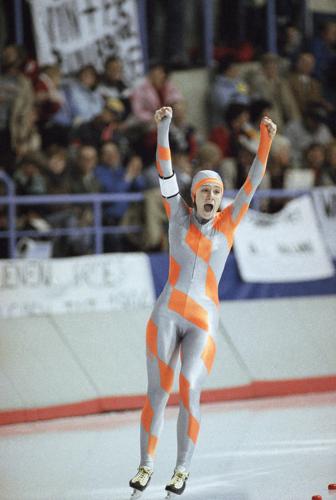By: Zachary Draves
Olympic speed skating legend Bonnie Blair has been the standard bearer in her sport for decades. Throughout her illustrious career she has captured six Olympic medals and is the most decorated woman in Winter Olympic history. But it was the 1988 Calgary games that thrust her into the spotlight and set her on a path towards the pantheon of greatness.
Four years prior in Sarajevo, the US speed skating team was coming off not gaining any medal which also happened to be Bonnie’s first games. After the extraordinary heights achieved by Eric Heiden in Lake Placid in 1980 where he won a record five individual gold medals, some thought that the glory days of US speed skating were long gone. But after dominating the Olympic Trials in the 500, 1000, and 1500 meters, Bonnie was determined to bring back home the gold.
In Calgary, Bonnie had her work cut out for her as she was going up against the East German phenom Christa Rothenburger in her best event the 500 meters. The year prior at the World Cup, Bonnie had set the world record with a time of 39.43 seconds. That record would eventually be eclipsed by Rothenburger in December.
There had been a longstanding rivalry between the American and East German skaters at the time and for Bonnie, these international experiences were something that motivated her.
“It was nice to be able to have those competitions and race against the best,” she said. “That to me was what it was all about. I wanted to be able to go against the best and that was just fuel for my fire all the time. Even just practicing when they were on the ice was exciting to me.”
Bonnie knew what she had to do and did herself one better. Not only did she win her first Olympic gold medal, she reclaimed the world record with a time of 39.10 seconds. That moment helped fuel the desire for Bonnie to achieve more going forward not just in Calgary but in future Olympics as well.

(Courtesy: International Olympic Committee)

(Courtesy: Youtube)
“It made me more excited for more,” she said. “I want to do this again. I’m already looking forward to the next Olympics as part of that, instead of I’m already done.”
Her next event was the 1000 meters. She had set an Olympic record in her race but then two of competitors defeated her and thus she came away with a bronze medal. Her third event was the 1500 meters where she came in 4th.
After the conclusion of the games, Bonnie was given the distinct honor of carrying the American flag during the closing ceremonies. Even with all that she had accomplished, she didn’t reap the rewards in terms of endorsements. Much of that had to do with the fact that speed staking wasn’t seen as marketable at that time. ABC’s coverage also wasn’t able to achieve a wide swath of viewership.
As a result, Bonnie took a break from the sport and enrolled at Montana Technological University. While many athletes would have relished big time endorsement deals, Bonnie was as humble as can be and for her it was about the love for the sport. In addition, the idea of Olympians receiving endorsements was a fairly new phenomenon.
“My thing was if something comes my way that’s great, but that wasn’t my driving force by any means, she said.” “I think back to that time when Corporate America was stepping up to the plate. It would have been different had it happened at this time in our life, but it was new back then and not the reason why I was skating.”
When it came to support, Bonnie had the best support system imaginable with her family affectionately known as the “Blair Bunch”. She had started skating at age two and competed in her first meet at four. Her parents Eleanor and Charlie were there for her every step of the way along with her five siblings.
While in Calgary, the “Blair Bunch” would show up in matching outfits to support Bonnie and enjoyed every minute of their time there. As she trained and competed, she wasn’t able to see them as often as she would have liked to, but just knowing they were gave Bonnie an added level of confidence.
“It’s comforting that they’re there,” she said.”The interaction I had was very few and far between and I needed to stay focused on what I needed to stay focused on. They realized that and that was kind of part of the “Blair Bunch” rule, leave Bonnie alone and let her do her thing.”
When asked what she remembers most from Calgary, Bonnie Blair says there are so many things that come to mind, but winning her first gold medal was the catalyst for what lay ahead for her in the years to come.

(Courtesy: AP Photo/Mark Duncan)
“It was about as close to a home court advantage that we have,” she said. “It was my first medal and I think doing something for the very first time has an unbelievable power and emotion behind it. That’s hard to capture again. That is not to say that my other wins weren’t thrilling and exciting. I think they all had their own little individualities of thoughts and emotions behind them, but that one was pretty impactful.”
Thirty five years later, Calgary has a special place in Bonnie Blair’s heart.